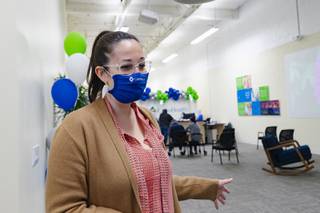Cano Health describes its entry into the Las Vegas market on a simple principle to address a basic unmet need: Health care is a necessity, and accessible, preventive and proactive care was not available at wide scale to low-income, minority patients.
Starting in October with a flagship location on Tropicana Avenue at Pecos Road and quickly following up with two more clinics on Charleston Boulevard and Arville Street and Lake Mead Boulevard and Civic Center Drive in North Las Vegas, the Miami-based Cano is poised to end 2021 with six locations valleywide. A seventh, being built from the ground up at Nellis Boulevard and Stewart Avenue, is expected in February 2022. The company has about 70 employees marketwide and will add about 90 more by the end of 2021.
And all this wasn’t even in motion pre-pandemic.
“What distinguishes Cano from many other groups is that we focus on the underserved, we reflect the population we serve, and only do primary care in a value-based fashion,” said Dr. Marlow Hernandez, Cano’s CEO and a family medicine physician.
Cano’s insurance payer partner Humana administers Medicaid dollars on behalf of patients to cover a monthly flat fee that lets patients visit a Cano clinic as many times as they want, with transportation included for those who need it. Most patients don’t have a co-pay.
The primary care sites have, or will soon have, dental, optical, wellness gyms, and benefits administrators who can connect patients to social services.
“Talking with a lot of industry leaders, the big concern has been that we are very siloed in Las Vegas between the hospitals and outpatient,” said Sara Irizarry, a Las Vegas-based Cano regional vice president. ”We’re just behind on making sure that we have that integration for our patients, so they end up in the hospital longer or not getting back to a (primary care physician). And then we also have a number of transportation issues.”
Walking through the Tropicana clinic, which took over a 20,000-square-foot former office supply store, Irizarry pointed out six exam rooms, including one for imaging. There’s a growing call center in the back. Half a dozen vans shuttle patients to appointments. Physiotherapy provides opiate-free treatment for pain management — a good option for the physical demands of hospitality work, Irizarry pointed out.
The locations are not just in neighborhoods where the socioeconomic needs are greatest but sited within short walks of other conveniences — the bustling Tropicana and Pecos intersection also has a Walmart, for example.
Hernandez said system-wide, 80% of his staff is minority, and more than 85% speak another language. Cultural affinity helps build trust, which leads to better patient outcomes, he said.
Cano has 71 locations in Florida, Nevada and Texas, with plans for more states — Irizarry also oversees efforts in Arizona and New Mexico. The three current Las Vegas locations are among the 18 that have opened nationwide in the past 18 months.
Humana approached Cano about Las Vegas in March and by July it had dialed in the Tropicana location. The company accelerated its schedule to meet the approaching October Medicare open enrollment deadline; having a roiling COVID-19 pandemic also added urgency, Hernandez said.
Family care physicians can be dangerously overloaded because reimbursements can be low, especially for lower-income patients, Hernandez said. Cano clinicians only see about 15 patients a day. About two-thirds of patients qualify for Medicaid; many are eligible for both Medicaid and Medicare.
Hernandez points out established research showing that low-income racial and ethnic minorities have the poorest clinical outcomes and access to care, leading to more costly complications. Treating the underserved under a traditional transactional model — paying per sick visit — doesn’t get traction because of limited financial resources, so Cano flipped to the proactive, flat-fee business model.
“It is incredibly reinforcing to come to work every day and see the impact that you’re having,” Hernandez said. “I describe it as revitalizing entire communities.”


